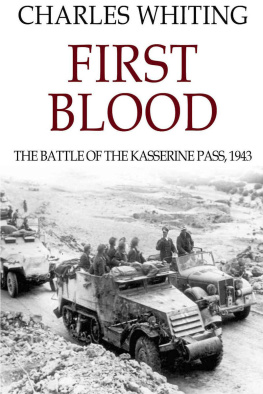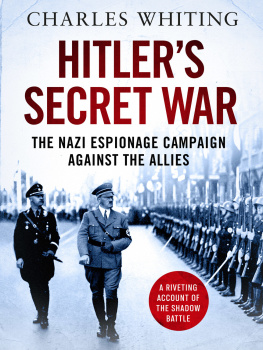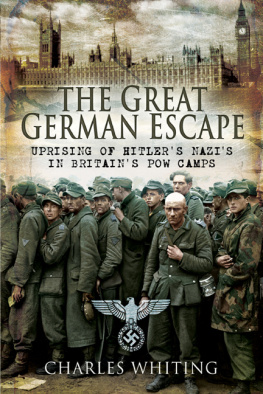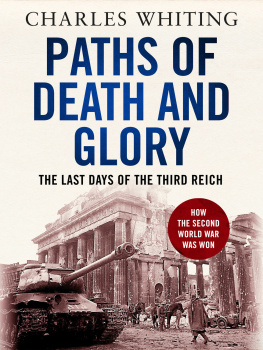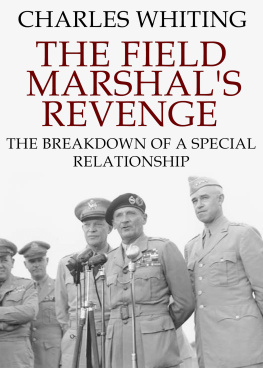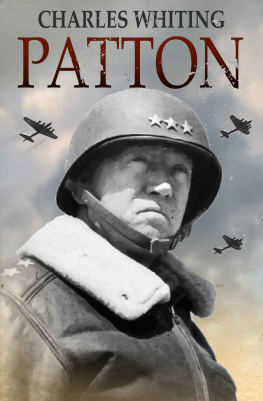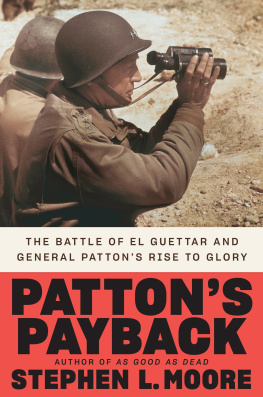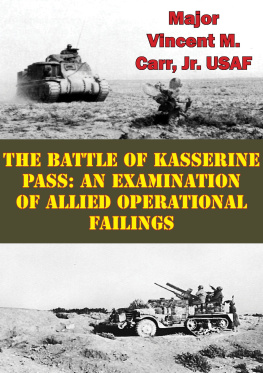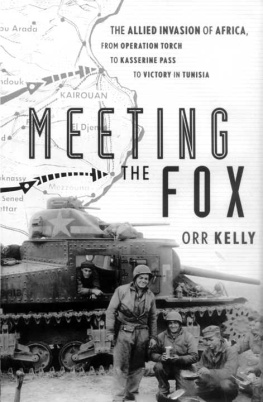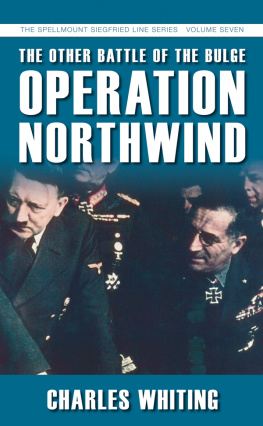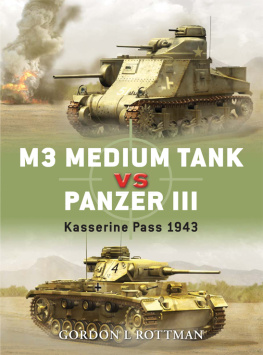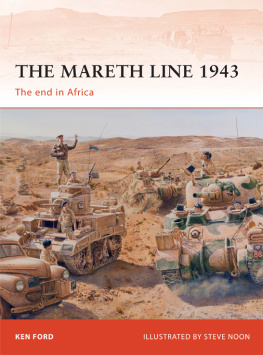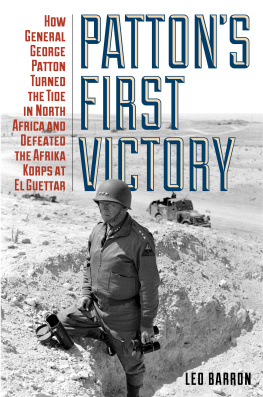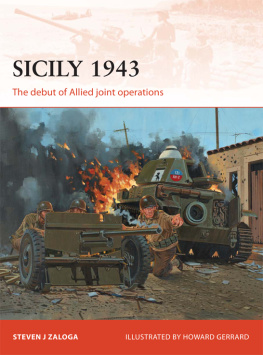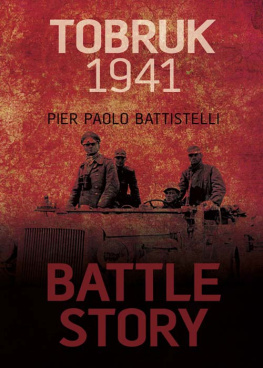First Blood
Charles Whiting
Charles Whiting, 2014
Charles Whiting has asserted his rights under the Copyright, Design and Patents Act, 1988, to be identified as the author of this work.
First published in Great Britain by Leo Cooper in association with Secker & Warburg Limited in 1984.
This edition published in 2018 by Bookzat Publishing Ltd
Secure from actual warfare, we have loved
To swell the war-whoop, passionate for war.
Coleridge
Times wrong-way telescope will show a minute man ten years hence, and by distance simplify. Through the lens see if I seem substance or nothing: of the world deserving mention or charitable oblivion. Remember me when I am dead and simplify me when Im dead.
Keith Douglas
(Killed in Action, 1944)
Table of Contents
AUTHORS NOTE
They called it Operation Torch. Naturally the codename was taken from Shakespeare.(1) Were they not coming this Sunday of November 8th, 1942, to liberate the French and to light a torch that one day would purify the whole of Occupied Europe with its sacred flame? Nothing but Shakespeare would do.
Now they prepared to land. They had brought their brass bands with them, their banners, their Class A uniforms. Their weapons they wouldnt need, of course. Hadnt they learned to chant the slogan saying who and what they were: Nous sommes soldats Americains ! Nous sommes vos amis !(2)
Undoubtedly they would be welcomed as liberators by cheering crowds of excited citizensthey had seen it all in the movies that Hollywood had been feeding them on for the last year or so. The occupied countries, with their heroic resistance movements, desired nothing more fervently than to be freed from those jack-booted, black-uniformed swine who bore that evil, crooked cross on their sleeves. So, as they clambered down the nets from their troopships all along the French North African coast, they were confident that they would be welcomed with open arms.
Three days of severe fighting followed. One thousand of these naive young men, these liberators, were killed; another one thousand were wounded. The first American soldiers to be killed in action in Europe in World War Two were shot by men they regarded as their allies. It seemed that the French were not so eager to be liberated from the Nazi yoke.
In the end, the French grudgingly agreed to let themselves be liberated. They laid down their arms in Africa and got on with the business of living again, leaving these brash Anglo-Americans to go elsewherepreferably as far away as possibleto fight the Germans, if thats what they wanted to do.
Life returned to normal in French North Africa. The brothels and the black market flourished. American dollars and English pounds poured into the local caisses and crdits . The Arabs continued to live their ragged, half-starved, miserable lives. The French prospered. The same administrators who had once served the Germans so loyally now worked for General Eisenhower, though not so loyally. The Allies were tactfully ignored. Let them play soldier out in the desert.
Now, on Saint Valentines Day, 1943, an American command met the Germans for the first time in battle in World War Two. Deep in the heart of North Africa, some 30,000 young Americans, most of whom had never before heard a shot fired in angerunder the command of an elderly, opinionated general, who had last seen combat a quarter of a century previouslyfaced up to an attack by no less a person than the Desert Fox himself. Rommel and his vaunted Afrika Korps , the veterans of two years of fighting in the desert, were coming for the new boys.
The result was predictable. Regiments were overrun; battalions broke and melted away into the desert; there was a mass slaughter of American armour. Drivers abandoned their vehicles in good running-order and fled. Hundreds of American soldiers surrendered without firing a single shot.
The Corps that had come to Africa with such youthful high hopes had suffered an overwhelming defeat. Nearly a quarter of those 30,000 men6,500 Americans (plus another 4,000 British soldiers who had come to their aid)were killed, wounded or taken prisoner. Nearly 400 armoured vehicles, 200 artillery pieces and 500 trucks and jeeps were lost.
At the very last moment, when it seemed that the whole Allied front in Africa would collapse, Rommel called off his attack. He was worn, sick, uncertain. He let them get away. But he had given the Americans a bloody nose. Now he could return to France to take charge of the anti-invasion army being set up there, confident he could beat the Amis if they ever dared to land there. Behind him he left a shaken, confused, deeply shamed American Army. Now it was up to them to learn the lessons of that terrible defeat and prepare for their next meeting with the Desert Fox.
This, then, is the story of Kasserine. It is the tale of youthful innocence sacrificed at the altar of the God of War by incompetent, complacent old men, who lived on to die in bed. The sacrifice was, as it always is in war, in the blood of youth.
PRELUDE TO A BATTLE
Vive la France ! ... Lafayette, we are here again for the second time !
General Mark Clark, 1942
General the light ! the young commander of the submarine called down from the conning tower urgently.
The tall craggy-faced Americanwhom Churchill liked to call his American Eagle on account of his beak-like noseclambered up the ladder out of the hot fetid atmosphere of the sub onto the bridge.
Yes, there it was: a white light gleaming from a height just above the deserted, moonlit shore. It was the signal agreed upon. The coast was clear.
Now there was no time to be lost. The British submarine HMS Seraph was at her most vulnerable out here in the bay, only two miles from the Algerian coast. The American general whispered an order and the four officers who were to accompany him on this daring secret mission prepared to board the frail wooden boats manned by three officers of the commandos Special Boat Section. Two days before, the three commandos had been shocked to find that they were landing not the seedy saboteurs they expected, but five members of the US Armys General Staff, led by no less a person than Eisenhowers deputy, General Mark Clark, the American Eagle.(1)
But the three British officers had no time now for wonder. They knew they could be spotted at any moment and it was two long miles to that foreign shore. With Lieutenant Livingstoneformerly of the Royal Ulster Riflesin the lead, the three boats set off in a V-formation.
At intervals, the commando officers stopped to scan the shoreline with their glasses, but it seemed quite empty. If anyone were out there to greet them, he was keeping himself well hidden. Or maybe their mission had been discovered? If so, they were paddling right into a trap.
They were sliding quietly through the water, their paddles dipping rhythmically into the inky sea. The first boat touched the empty beach in a soft wash of gentle ripples. Livingstone and his passenger, Colonel Julius Holmes of the US Civil Affairs branch, took a quick look around. Nothing stirred. They might have been the last men alive. Hastily the former member of the sedate State Department, who had never done anything quite like this before, flashed the agreed-upon signal: the letter K with his torch.
Two hundred yards out at sea, General Clark spotted the signal and nodded to the S.B.S. officer.
There it is ... Lets go!
The young officer needed no urging. It was not every day of the week that he lay off an enemy coast, carrying the second top man of the US Army in Europe as his passenger. The responsibility was almost overwhelming. He set off paddling, while the American general, who was twice his age, tried vainly to keep up with him. Minutes later they were dragging their craft up the sand, intent on hiding it in the black shadows among some bushes at the foot of the bluff.
Next page
